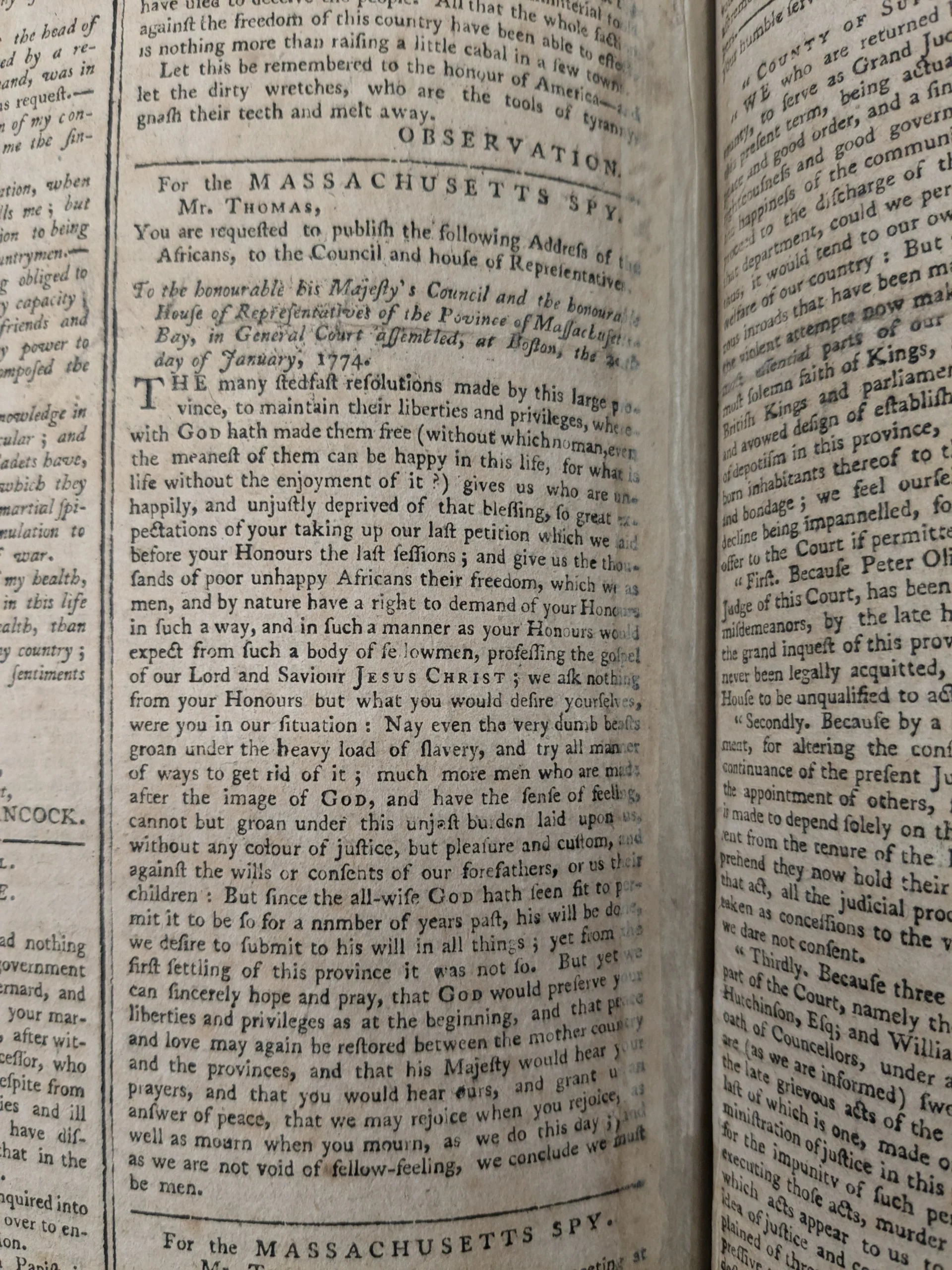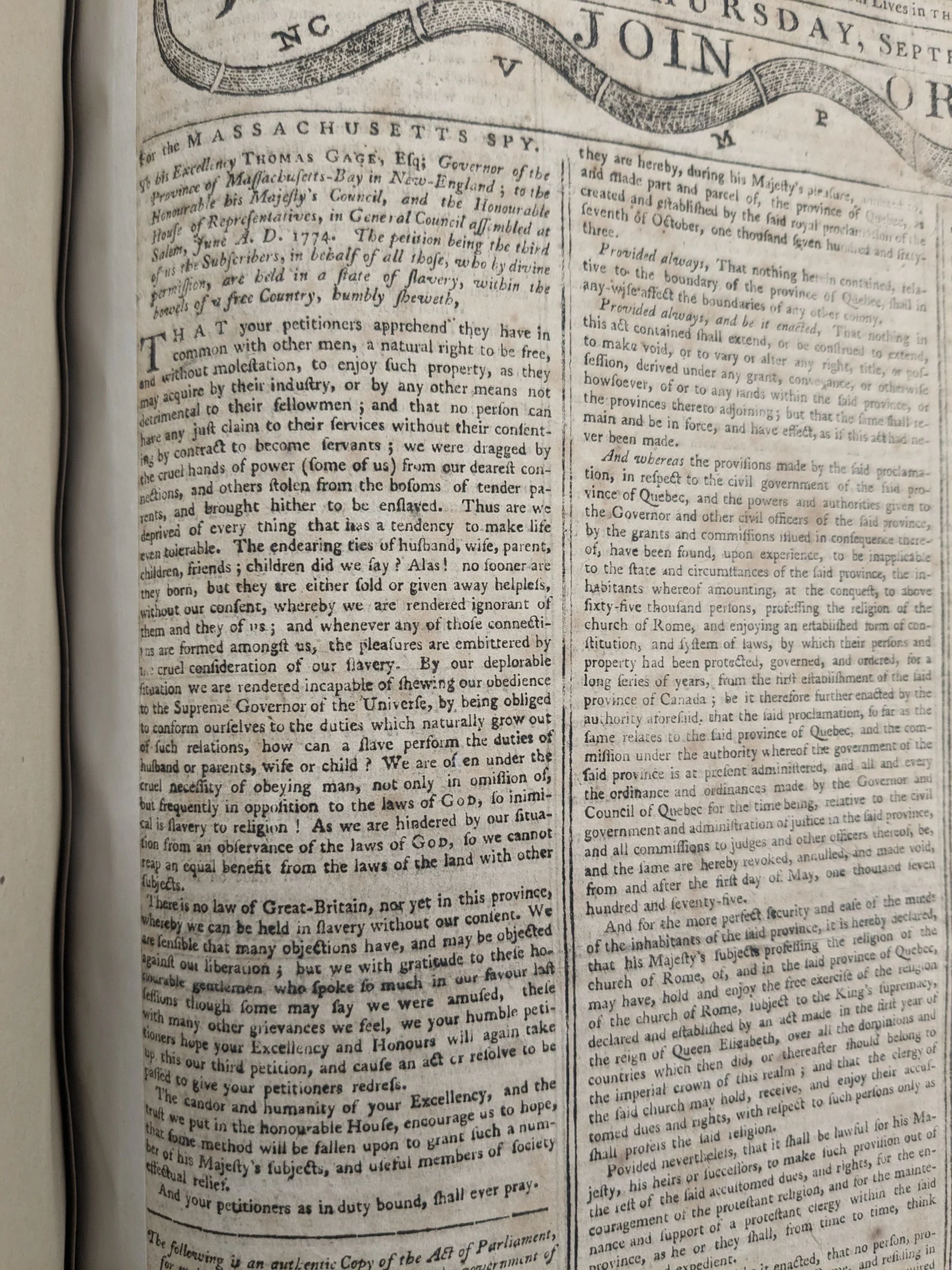massachusetts Freedom Petitions
Petitioner Appeals in The Massachusetts Spy (1774)
Many enslaved peoples petitioned for their freedom in January 1773. Below are two of the petitioners’ appeals, presented to the General Court of Massachusetts in 1774 and reprinted in the patriot newspaper, The Massachusetts Spy.
Introduction
Seizing the novel opportunities presented by the imperial crisis with Great Britain, “many Slaves, living in the Town of Boston, and other Towns in this Province,” petitioned for their freedom and other “liberties” in January 1773. Led by Felix Holbrook and joined by other Black signatories such as Chester Joie, Sambo Freeman, and Peter Bestes, their campaign would ultimately garner the support of leading white patriots in Boston and other towns throughout Massachusetts. Their 1773 appeal, while not immediately successful, would influence the new constitution of 1780 and help lead to the effective and legal abolition of slavery in their state.
Below are two of the petitioners’ appeals, both presented to the General Court of Massachusetts in 1774 and reprinted in the patriot newspaper, The Massachusetts Spy. In these documents we may witness the petitioners’ masterful familiarity with and use of Christian, republican, and natural rights discourse to make their case. Insisting on their dignity as men, they claimed a “right to demand” of the patriot opposition “in such a way, and in such a manner as your Honours would expect from such a body of fellowmen, professing the gospel of our Lord and Saviour Jesus Christ.” In petitioning, they also reveal their consummate expertise in navigating Massachusetts’s political and legal system. Making an oblique reference to the famed case Somerset v. Steuart, for instance, they argue how “there is no law of Great-Britain, nor yet in this province, whereby we can be held in slavery without our consent.”
The authors of these documents ultimately joined the colonial opposition to help bring about the downfall of royal government in Massachusetts, praying that “we may rejoice when you rejoice.”1A reference to Romans 12:15. Endorsed by local patriot luminaries such as James Swan and John Allen, their efforts were published frequently in patriot newspapers like Spy, and their campaign inspired towns and counties across Massachusetts to voice their opposition to slavery or to even endorse civil equality. Though little information remains about any of these men during the American War for Independence, Holbrook would volunteer to fight in the Rhode Island militia and Primus Hall, the son of another petitioner, Prince Hall, enlisted with the Massachusetts 5th Regiment.
Moreover, the movement the freedom petitioners unleashed would make a lasting impact on revolutionary discourse and the fate of slavery in the North. These petitions were almost certainly the source of inspiration for copycat petitions that emerged in New Hampshire, Connecticut, and nationally in 1778, 1779, 1797, 1780 and 1800, and they influenced St. George Tucker’s bill for gradual emancipation in Virginia in 1796.
The freedom petitions helped launch a strategy for abolition and amelioration of Black slavery and improvements in their civil status that lasted well into the nineteenth century. Among the first to interpret the Declaration of Independence as committing the nation to the principle of human equality – in their last appeal, they note “they have, in common with all other Men, a natural & unalienable right” to freedom – the freedom petitioners also helped first give voice to one of the richest refrains in America’s language of liberty.
Questions to Consider:
- How were Black colonists able to influence Massachusett’s political and legal system? Why might they have been unable to play a similar role in colonies like South Carolina?
- Why might white patriots in Massachusetts, like The Massachusetts Spy editor Isaiah Thomas, be interested in supporting the petitioners’ campaign?
- Compare these documents to Lord Dunmore’s Proclamation of November 1775. Recent scholarship suggests that the same number of African American men fought for the patriots as for the British (though these figures are still subject to revision). 1
- 1
See Holton and Nash in further reading.
What factors might have led Black colonists to make the decisions they did when enlisting with one side or the other?
- 1
- What kinds of claims to rights did these petitions make, and on what basis?
Grant Stanton
Further Reading
- David Brion Davis, The Problem of Slavery in the Age of Revolution, 1770-1823 (Ithaca, NY: CUP, 1975)
- Benjamin Quarles, The Negro in the American Revolution (Chapel Hill, NC: UNCP, 1961)
- Manisha Sinha, The Slave’s Cause: A History of Abolition (New Haven, CT: YUP, 2016)
- Grant Stanton, “The Freedom Petitions: Black Patriotism, Black Politics, and the Abolition of Slavery in Massachusetts, 1773-1783,” Early American Studies (forthcoming)
- George Washington Williams, A History of the Negro Race in America from 1619 to 1880 (New York, NY: G.P. Putnam’s Sons, 1883)
- Footnote 1: Woody Holton, Liberty is Sweet: The Hidden History of the American Revolution (New York: Simon & Schuster, 2021), 211; Gary Nash, “The African Americans’ Revolution,” in The Oxford Handbook of the American Revolution, eds. Jane Kamensky and Edward G. Gray (Oxford: Oxford University Press, 2012), 254, 261.
Sources
- The Massachusetts Spy Or, Thomas’s Boston Journal (Boston, Massachusetts) IV, no. 187, September 1, 1774: [1]. Images courtesy of the Library of Congress, Washington, D.C.
- The Massachusetts Spy Or, Thomas’s Boston Journal (Boston, Massachusetts) IV, no. 188, September 8, 1774: [1]. Images courtesy of the Library of Congress, Washington, D.C.
- Transcriptions by Michael Becker and Dylan Bails.
Cite this page
Download
- Transcription
- Document:
Content Warning
Please be aware that many of the works in this project contain racist and offensive language and descriptions of punishment and enslavement that may be difficult to read. However, this language and these descriptions reveal the horrors of slavery. Please take care when transcribing these materials, and see our Ethics Statement and About page.
[From The Massachusetts Spy, Sept. 1, 1774]

For the MASSACHUSETTS SPY,
Mr. THOMAS,
You are requested to publish the following Address of the
Africans, to the Council and house of Representatives.
To the honourable his Majesty`s Council and the honourable
House of Representatives of the Povince 2 Province of Massachusetts-
Bay, in General Court assembled, at Boston, the 20th
day of January, 1774.
THE many stedfast resolutions made by this large pro-
vince, to the maintain their liberties and privileges, where-
with GOD hath made them free (without which no man, even
the meanest of them can be happy in this life, for what is
life without the enjoyment of it?) gives us who are un-
happily, and unjustly deprived of that blessing, so great ex-
pectations of your taking up our last petition which we laid
before your Honours the last sessions; and give us the thou-
sands of poor unhappy Africans their freedom, which we as
men, and by nature have a right to demand of your Honours
in such a way, and in such a manner as your Honours would
expect from such a body of fellowmen, professing the gospel
of our Lord and Saviour JESUS CHRIST; we ask nothing
from your Honours but what you would desire yourselves,
were you in our situation: Nay even the very dumb beasts
groan under the heavy load of slavery, and try all manner
of ways to get rid of it; much more men who are made
after the image of GOD, and have the sense of feeling,
cannot but groan under this unjust burden laid upon us,
without any colour of justice, but pleasure and custom, and
against the wills or consents of our forefathers, or us their
children: But since the all-wise GOD hath seen fit to per-
mit it to be so for a nnmber3 numberof years past, his will be done,
we desire to submit to his will in all things; yet from the
first settling of this province it was not so. But yet we
can sincerely hope and pray, that GOD would preserve your
liberties and privileges as at the beginning, and that peace
and love may again be restored between the mother country
and the provinces, and that his Majesty would hear your
prayers, and that you would hear ours, and grant us an
answer of peace, that we may rejoice when you rejoice, as
well as mourn when you mourn, as we do this day; and
as we are not void of fellow-feeling, we conclude we must
be men.
[From The Massachusetts Spy, Sept. 8, 1774, page 1]

For the MASSACHUSETTS SPY.
To his Excellency THOMAS GAGE, Esq; Governor of the
Province of Massachusetts-Bay in New-England; to the
Honourable his Majesty’s Council, and the Honourable
House of Representatives, in General Council assembled at
Salem, June A. D. 1774. The petition being the third
of us the Subscribers, in behalf of all those, who by divine
permission, are held in a state of slavery, within the
bowels of a free country, humbly sheweth,
THAT your petitioners apprehend they have in
common with other men, a natural right to be free,
and without molestation, to enjoy such property, as they
may acquire by their industry, or by any other means not
detrimental to their fellowmen; and that no person can
have any just claim to their services without their consent-
ing by contract to become servants; we were dragged by
the cruel hands of power (some of us) from our dearest con-
nections, and others stolen from the bosoms of tender pa-
rents, and brought hither to be enslaved. Thus are we
deprived of every thing that has a tendency to make life
even tolerable. The endearing ties of husband, wife, parent,
children, friends; children did we say? Alas! no sooner are
they born, but they are either sold or given away helpless,
without our consent, whereby we are rendered ignorant of
them and they of us; and whenever any of those connecti-
ons are formed amongst us, the pleasures are embittered by
the cruel consideration of our slavery. By our deplorable
situation we are rendered incapable of shewing our obedience
to the Supreme Governor of the Universe, by being obliged
to conform ourselves to the duties which naturally grow out
of such relations, how can a slave perform the duties of
husband or parents, wife or child? We are often under the
cruel necessity of obeying man, not only in omission of,
but frequently in opposition to the laws of GOD, so inimi-
cial is slavery to religion! As we are hindered by our situa-
tion from an observance of the laws of GOD, so we cannot
reap an equal benefit from the laws of the land with other
subjects.
There is no law of Great-Britain, nor yet in this province,
whereby we can be held in slavery without our consent. We
are sensible that many objections have, and may be objected
against our liberation; but we with gratitude to these ho-
nourable gentlemen who spoke so much in our favour last
sessions though some may say we were amused, these
with many other grievances we feel, we your humble peti-
tioners hope your Excellency and Honours will again take
up this our third petition, and cause an act or resolve to be
passed to give your petitioners redress.
The candor and humanity of your Excellency, and the
trust we put in the honourable House, encourage us to hope,
that some method will be fallen upon to grant such a num-
ber of his Majesty’s subjects, and useful members of society
effectual relief.
And your petitioners as in duty bound, shall ever pray.
Collections
Tags
Footnotes
- 1A reference to Romans 12:15.
- 2Province
- 3number